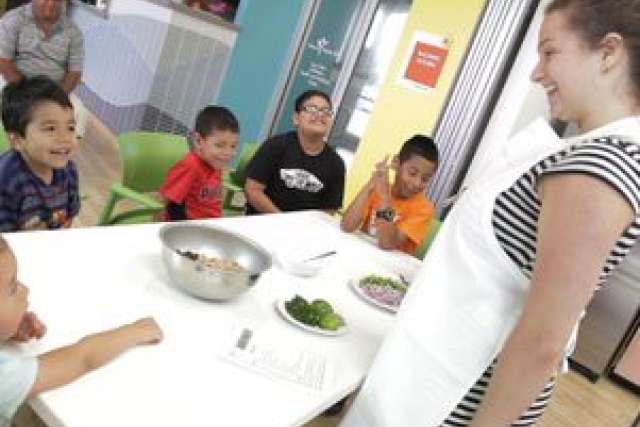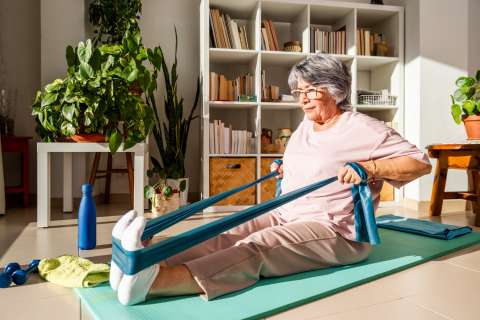UCLA senior Claudia Varney leads a cooking class for children at the Venice Family Clinic in Culver City. Varney is one of 20 UCLA students enrolled in this summer's inaugural Food Studies and Food Justice class, funded by the UC Global Food Initiative.
Food is something that fuels your body. But how often do you consider where food comes from, its nutritional value or the factors that commonly prevent people from eating well?
This summer, 20 UCLA students are learning about food and food justice as part of a new class funded by the UC Global Food Initiative, launched in 2014 as a platform to encourage collaboration among experts from all 10 UC campuses to address some of the world’s most pressing food issues.
“Food is a hot topic right now,” said Kathy O’Byrne, who teaches “Food Studies and Food Justice” and directs UCLA’s Center for Community Learning. “Whether it’s research, policy, waste, marketing, logistics or event planning, or looking at the relationship between government regulation and government assistance around food programs, or the level of hunger, poverty and homeless people in L.A. — these things are interconnected on every level.”
As part of the 10-week class, the students are learning about food policy, environmental issues, the science of food, public health connections and how food is portrayed in literature and media, said O’Byrne.
Beyond the classroom, O’Byrne’s students are lending a hand at the Venice Family Clinic, MEND, Food Forward, Seeds of Hope and Kindred Spirits Care Farm. By the end of the quarter each student-intern will have worked 120 hours at one of these sites.
Empowering families through education and culinary inspiration is something that Claudia Varney and three other students are addressing at the Venice Family Clinic’s new children’s health center in Culver City. The students are helping out at cooking classes for low-income and uninsured children and families who use the clinic’s services.
Creating recipes and shopping for ingredients can be the trickiest part of the process, said Varney, a world arts and cultures student.
“All of the ingredients must be available at the market next door,” said Varney, adding that it only makes sense to share recipes that use items that are readily available to people in their communities.
Another challenge is coming up with recipes that can feed large and, in some cases, multigenerational families where kitchen space and tools may be lacking.
“Because of gentrification in the area, you have really condensed living situations without a full kitchen. … They’ll just have a hot plate,” said Varney, who is also a 2015 UC Global Food Initiative Fellow. “What can you make for eight with just a hot plate? What can you use? What can you do with the smallest number of dishes to feed the most people?”
Jack Cramer, a biology major, is interning at Seeds of Hope, a program run by the Episcopal Diocese of Los Angeles that turns vacant church-owned land into community gardens and orchards throughout a six-county area. Not only does the program provide healthy and fresh food, the project helps educate the community about diet, exercise and nutrition.
“Being able to go and see firsthand something you’ve talked about in an intellectual abstract form in the classroom is really cool and far more impactful than a lot of typical learning methods I’ve encountered,” said Cramer, who plants and cares for gardens and trees, helped install an irrigation system for the gardens and assists with the program’s cooking and nutrition classes.
He and his group have also attended meetings of the L.A. Food Policy Council, adding an extra layer of insight to their learning.
“I’ve lived in L.A. my whole life, and I’ve seen more of the city in the past month than I ever have before, thanks to this class,” Cramer said.
The intern said he can’t help but notice as he travels around the city that the ratio between fast-food restaurants and grocery stores is much higher in some neighborhoods than in others.
“If you care about social justice issues and equity, the first step to making any change is to see a problem and understand it,” he said. “First and foremost, we need to be aware. That’s the first step to creating social change and hopefully making a difference.”
Students and residents aren’t the only ones benefitting from this new class and UCLA’s commitment to service learning and civic engagement. The organizations are also reaping the benefits.
Two of Varney and Cramer’s classmates are interning at Food Forward, an organization that recovers unsold or unused produce and redirects it to people in need. The interns are helping with outreach and volunteer recruitment, primarily in West Los Angeles, and collecting food donated each Sunday by vendors at the Pacific Palisades Farmer’s Market. They are also writing blog posts for the organization’s website.
“We absolutely couldn’t do anything without our volunteers and interns,” said Joe Bobman, who coordinates the activities of many of Food Forward’s 3,600 volunteers. This year the organization will collect upwards of six million pounds of food and serve nearly one million people in Los Angeles and five neighboring counties. “Our volunteers and interns 'power' 125 events each month.”
Bobman’s appreciation of UCLA students goes beyond their volunteer work. Students in UCLA’s “Philanthropy as Civic Engagement” class awarded Food Forward a $29,000 grant last fall. Those funds were used to hire Bobman. An additional $25,000 grant was awarded to the Food Forward after two student representatives from UCLA’s philanthropy class won the money as part of a national intercollegiate pitch competition sponsored by the Once Upon a Time Foundation, the organization that supplies funds for the philanthropy class and similar courses at 10 other universities and colleges. Food Forward used the money to support a manager for its backyard harvesting program.
“It was really wonderful to get these funds,” said Emily Parker, director of development. “It was an incredible surprise.”
To celebrate the success of the inaugural “Food Studies and Food Justice” class, UCLA’s Healthy Campus Initiative, in partnership with the Center for Community Learning, is hosting a reception to recognize the efforts of O’Byrne, her students and the five partner organizations. The event, which will feature a screening of the documentary “Our Food Chain” will be held Tuesday, August 25, at the UCLA Neuroscience Research Building Auditorium from 6:30–8:30 p.m. Those interested in attending must RSVP by August 19.



